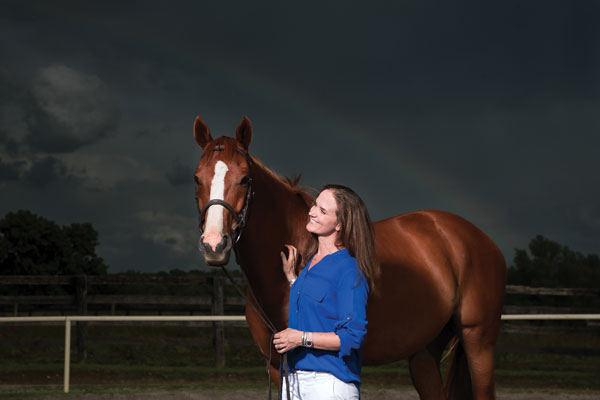How to Train a Horse – Tough Love


Learning how to train a horse with tough love started with my chestnut, Chizzy. He’s the first young horse I have ever owned; I adopted him at age 3 from the racehorse rehoming organization I work for. He’s opinionated, with personality to spare, and I adore him.
The barn is one of the only places many adult amateurs can go to escape the never-ending pressure of decision making—and its consequences—that we face at work and at home. This relative feeling of freedom is why it can be hard to flip the switch back when training a horse to “tough love dictator” that moms and dads know so well if you’re having a particularly rough time with your four-legged friend.
Instilling Confidence
Many racehorses have zero social skills when they retire from the track. This is because they’re kept in a stall and only brought out to work. When they retire from the track, training a horse is necessary. They have to be taught how to behave like a horse all over again.
When I adopted Chizzy, I brought him to the farm where I board. He stayed in the round pen for a few days before being turned out in our Thoroughbred field. And by “turned out,” I mean “ran away from all the other horses like his tail was on fire.”
Chizzy was so intimidated by the other horses that I couldn’t even get his halter off some days because he was so anxious. It was all I could do to unclip the lead before he ran for the back of the field.
As Chizzy began to figure out his new life with me, his confidence grew, and his personality became more apparent. His self-confidence in the ring learning how to jump was intimately tied to his confidence in the field.
He’s now nicknamed the “welcoming committee,” since he greets each new horse, shows them around the field and “introduces” them to all his friends. When I turn him back out after a ride, his small herd is usually waiting for him at the gate.
Reluctant Fighter
It’s amazing how the deepening of the horse-human relationship can instill a sense of purpose and confidence—and not just in horses.
Chizzy is the toughest ride I’ve ever had. He’s not mean or malicious. He’s not a runaway or a dirty stopper at jumps, or any of the scary things horses can be. Due to being the happiest horse in the world, he doesn’t want to exert much effort (like, any). He will often take the easy way out.
My trainer, Nori, is the most amazing coach, especially with adult amateurs and all that we entail, like deep-seated fears and anxiety. She also owns half of Chizzy, though many days when she watches me ride, she’ll deny it. Ever the queen of analogies, Nori likens Chizzy to a 14-year-old boy who would rather sit in his room and play video games all day than work. So he makes me work for it.
I’m a strong rider, but also quiet to a fault. Like anyone whose job is stressful, I ride for fun. I love to win, don’t get me wrong, but I ride much more for the stress relief, physical exertion, and the sense of peace that being on a horse brings me. What I don’t want to do when I go to the farm? Fight.
The End Result
But sometimes, fight I must (with encouragement from Nori) to show the red horse who’s boss. As Nori says, “He’s not broke enough to have an opinion yet!” And she says when training a horse I must tell him that “no” is not an option and teach him that humble horses are good horses. To her horror, I just laugh.
Being hard on your kid, whether two- or four-legged, is tough. I want Chizzy to love me. I never want him to stop running to the gate whinnying for me. I just need to be reminded sometimes that being hard on him won’t make him love me any less, and in the end, I’ll have a better horse because of it.
Tough love is just that—tough. It’s tough to be on the receiving end of the lesson, but it’s also tough to be the one doling out the consequences. But just as raising respectful, well-adjusted kids requires perseverance and diligence, so does raising good horses—and good horses have a better chance of staying out of bad situations.
So stay tough. Your horse will thank you.
This article about how to train a horse appeared in the May 2020 issue of Horse Illustrated magazine. Click here to subscribe!
Recent Posts
Bed Sores in Horses
As you brush your horse’s lower legs, you spy something curious. There’s a little patch of hair that’s ruffled, like…
A Recap of Road to the Horse 2025
Road to the Horse is an exciting, unique colt-starting event, dedicated to changing people’s ideas and creating a better world…
2025 Defender Kentucky Three-Day Event: An Impressive List of Entries
Lexington, Ky. — Six of the world’s top 12 eventing riders, including World #1 Tom McEwen (GBR) and World #2…
2025 Defender Kentucky Three-Day Event
Stay up to date on the action from the 2025 Defender Kentucky Three-Day Event. Find information about the event, including…
Ryan Rose: Creating Strong Partnerships Between Horses and the People Who Love Them
Ryan Rose got bit by the cowboy bug early in life. "My love of horses started when I was a…
Breed Profile: European Brabant
While draft horses come in many shapes and sizes, from the gigantic Shire to the smaller Haflinger, most have something…